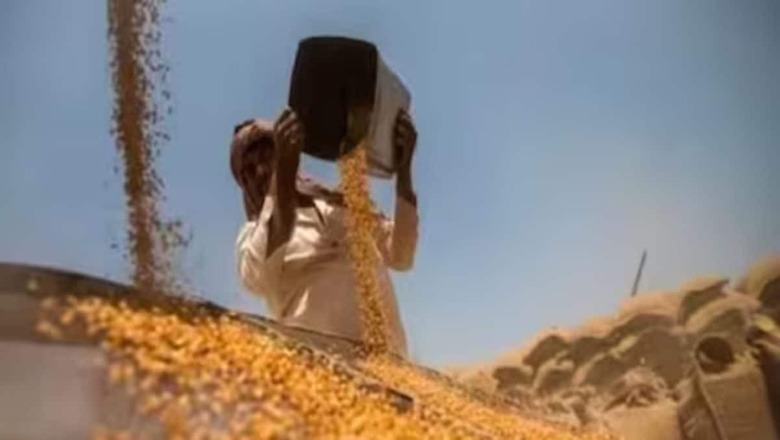
views
Days after imposing stock limits on pulses, the government has now imposed stock limits on wheat from June 24, 2024 to March 31, 2025.
Food and Public Distribution Secretary Rohit Singh said, “With regard to wholesellers, it is 3,000 tonnes. For retailers, it is 10 tonnes, and for big chain retailers, it is 10 tonnes per outlet, and a total of 3,000 tonnes. For processors, the limit is 70% of their monthly installed capacity multiplied by the remaining months of the financial year 2024-25. These stock limits are in force until March 31, 2025.”
Singh said these limits would be reviewed based on requirements and necessity. “We will be taking action as required which would ensure that the prices of wheat remain stable.”
‘NO SHORTAGE OF WHEAT; PRICES STABLE’
Singh rubbished reports of shortage of wheat in the country. “There is no shortage of wheat in the country. The opening stock of wheat, as on April 1, 2023, was 82 LMT. The opening stock of wheat on April 1 this year was 75 MLT, so it means 7 LMT less than 2023 . Having said that, we also have 4 LMT of additional procurement this year vis-a-vis last year. Our procurement this year, as of today, is 266 LMT against 262 LMT in the RMS 2023. That means our procurement has been more than last year and our opening stock was 7 LMT less than last year. Broadly, we are only 3 LMT less than what was the position last year. There is no shortage of wheat.”
The government reiterated that so far the wheat prices have been stable. “Prices have not gone up in 2023-24. Similarly, prices will be kept stable in 2024-25. The government has many tools at its disposal. Wheat stock limit is just one, there are other tools too. I would like to reiterate that all options are kept open with the government. No option has been closed,” he said.
“As of now, only one of the tools, stock limits, has been used. Based on the requirement, we would use the other tools as and when needed. The prices are stable and in the interest of the consumer of the country, we would like to maintain some stability in prices and not let them spike.”
However, the question is if the price of wheat is stable and there is no shortage, why is the government imposing a stock limit? “Shortage is not there, so why are we imposing stock limits? …There are persistent reports coming in the media …Vested interests are creating the image that the government does not have the stock. One report came from Jaipur, which was very alarming, that we don’t have stocks to fulfil our PDS requirement. As people are hoarding, there is a lot of holding back of stocks by traders and they would obviously like prices to go up. That is what we are targeting traders and holding back on stocks, even while there is no dearth of wheat in the market. They should release the stock in the market which should make the availability very ample,” explained Singh.
PRICES OF PULSES
As far as pulses are concerned, the government claimed that there has been a moderation in prices just days after the stock limits were imposed. Nidhi Khare, Secretary, Consumer Affairs, said, “Since we imposed stock limits on tur and chana dal, we can see that there is already an effect on market rates and the prices have started coming down.”
She also said that as far as chana is concerned, prices came down by Rs 50-200 per quintal in major wholesale markets; in case of Kabuli chana, prices came down from Rs 100 to 300 per quintal; and in case of tur, from Rs 50-200 in major markets.
Traditionally, pulses is a pain point, with the country resorting to imports year after year. However, in spite of challenges, the government is hopeful of creating a buffer stock of around 10 LMT of pulses for the first time. Khare said, “There are several factors which help us in moderating the prices. One being very good rain prediction after almost one full year of El Nino and very high heat wave, which has impacted all vegetable, fruit and cereal production, including pulses. This is an opportunity for us to expect much more area to be sown under tur and urad for price realisation.”
The state governments’ enhancement of area under sowing of tur and urad, constant dialogue between farmers and cooperative bodies such as NCCF and NAFED, distribution of good quality seeds and good monsoon forecast are leading to optimism within the government. “We should be in a position not just to moderate prices of pulses, but also create some buffer stock. The stock limits on the two pulses have started bearing results. Given the good monsoon condition, we should be able to see reasonable prices, price moderation and softening of these prices,” she added.
ONIONS AND POTATOES
The government has been watching the rising prices of onions and potatoes in the past one month. “Because of the heat wave, production of green vegetables came down, which is why the consumer’s dependence on potatoes and onions has increased. However, because of the good monsoon, you will start getting green vegetables in the market again and the prices of potatoes and onions will also come down in the coming days.”
The forecast for onion production is optimistic, with the targeted area for onion production going up from 285 lakh hectares to 353.35 lakh hectares. “For the Kharif sowing, farmers have been very optimistic, looking at the high price realisation form the Rabi onion. This year, we can say that the actual target has also increased. Last year, when the actual sown area was 285 lakh hectares, this year, the targeted area is 353.35 lakh hectarea. And this is about the top 10 states. Other states, who also contribute to the cultivation of onions, will also be doing it. So this is also something which is positive.”
The government said that as of now, there is no proposal to review the ban on wheat exports or restrictions on sugar exports.




















Comments
0 comment